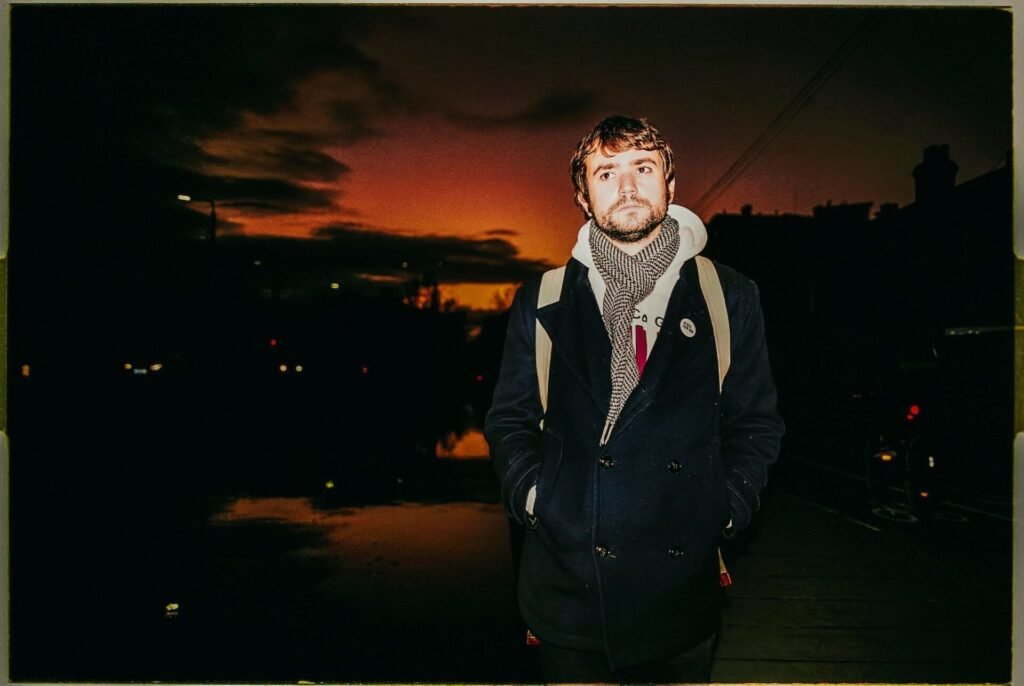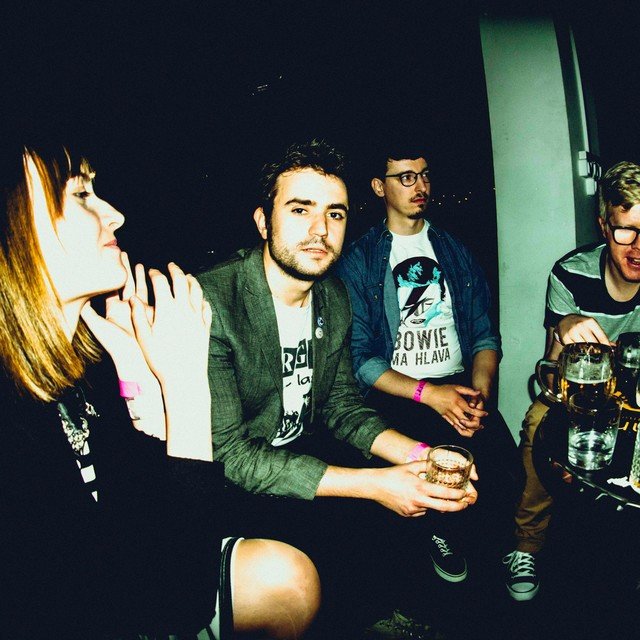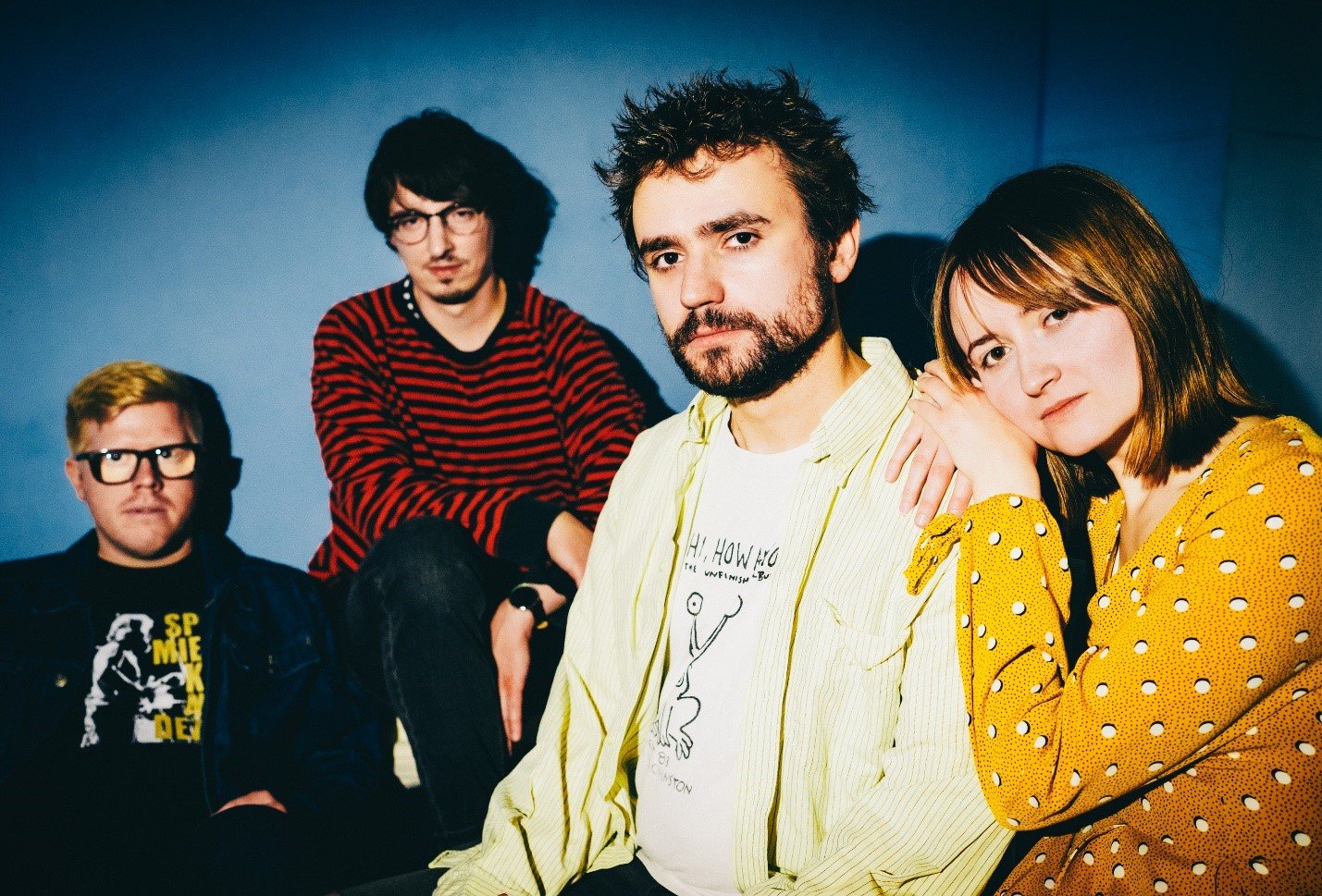Bratislava-born singer-songwriter Vlado Nosal performs music. He began his career playing in the alternative rock group Queer Jane, which has been dubbed “the best indie band you have never heard of” and has released three critically acclaimed albums. Their song “A Happy Drunk” received more than 600 000 streams after being added to the official Spotify playlist Acoustic Rock. Vlado has collaborated with artists from all over the world, including The Brian Jonestown Massacre and Boo Hewerdine, thanks to his talent for memorable melodies and lyrical wit. The Avedons, Nosal’s backing band, are currently on the road and in the studio. Their music expertly combines classic rock’n’roll with a more experimental, lo-fi edge, all the while adhering to the “songs first” philosophy.
Vlado Nosal, a former frontman for the preeminent Slovak indie rock band Queer Jane, releases his debut solo single. It represents yet another cross-border collaboration, with Nosal working with multiple Grammy-nominated producer Ken Coomer (Wilco, Sheryl Crow, Billy Bragg, Al Green), as well as Boo Hewerdine, a frequent collaborator. The song’s lyrics, which mention “an awful lot of people in heaven” who “couldn’t get a room in hell,” can be interpreted as both an ode to escape and a lighthearted response to the current state of the world. Check out the exclusive interview with Vlado and the song “Cold Cigarettes” below:

1. Can you tell us a bit about where you come from and how it all got started?
VLADO NOSAL & THE AVEDONS: HI! My name is Vlado, I come from Slovakia and I currently live in Bratislava. I have been playing in bands and writing songs since I was a kid (I’m 29 now). When I was 17, I started to really like what I was writing, so I formed Queer Jane – the first proper band that I fronted. We went on to play tons of gigs and release three albums before splitting up during lockdown. But we had fun and it taught me a lot.
This year I founded Vlado Nosal & The Avedons. I actually started solo, but during a party, I asked Barbara Vojtasakova to join me on keyboards and vocals, just like that, out of the blue. She reluctantly agreed but seems quite happy with her decision now. I know I am. On bass we have Lukas Valter, who is my old musical friend – he’s played with me in Queer Jane almost since day one. Jergus Vyskocil is our drummer, but he can play almost anything and also played with Queer Jane for some time. I mostly play guitar and sing. We released our debut single Cold Cigarette in October and a new album is in works.
2. Did you have any formal training or are you self-taught?
VLADO NOSAL & THE AVEDONS: I am mostly self-taught, although I did attempt attending some lectures when I was a kid – it never quite lasted though. The most important stuff I learned from my dad, a self-taught guitarist like me. He showed me the chords and pretty soon I was playing songs. I’m still learning mainly by listening to music.
3. Who were your first and strongest musical influences and why the name ‘VLADO NOSAL & THE AVEDONS’?
VLADO NOSAL & THE AVEDONS: As a kid I loved punk rock and it still means a great deal to me, not just musically, but also attitude-wise. Nirvana was also a big influence when I started playing guitar, mainly because their songs were loud, catchy and they had weird chord changes, which is something that fascinates me to this day. The single biggest influence would be The Beatles, however. Their songs were being played at our house all the time, but it’s more than that – my relationship with their music deepens every day. And of course, being a singer-songwriter, I am always looking up to the giants: Bob Dylan, Lou Reed, Elliott Smith, Lucinda Williams, Jeff Tweedy – the list could go on and on.
When my band Queer Jane broke up, I realized I no longer wanted to hide under any monikers. Even in the band, I was always the principal songwriter and de-facto the leader, so I figured – why not go solo and use my own name? The songs I’m playing are pretty personal anyway. I started to think of the backing band as a separate entity, probably somewhat inspired by Elvis Costello & The Attractions. One day I thought of Richard Avedon – a great photographer from the 60’s – and thought his surname would really fit this group of people. And it does.
4. What do you feel are the key elements in your music that should resonate with listeners, and how would you personally describe your sound?
VLADO NOSAL & THE AVEDONS: What appeals to our listeners is probably the fact that we think melody is the king. Many of today’s artists are so concerned with production they sometimes forget to write the songs.
I also like to think of Vlado Nosal & The Avedons as a true rock and roll band – in the broadest possible sense. We take cues from all of rock history, whether it’s Everly Brothers or Kraftwerk. Our live sound reflects this – we have no problem following a Sinatraesque ballad with a fuzzy distorted noise rock in our sets.

5. For most artists, originality is first preceded by a phase of learning and, often, emulating others. What was this like for you? How would you describe your own development as an artist and music maker, and the transition towards your own style, which is known as INDIE?
VLADO NOSAL & THE AVEDONS:
I don’t think I’ll ever stop learning, but the most important thing for singer-songwriters is to find their voice. Both metaphorically and literally. At this point, I’m happy articulating my feelings through music. And it probably goes hand in hand with being comfortable with how I actually sound. I am a shy person and it took me some time to be at ease with being the lead singer. Most of the nights now, I don’t even think about it – I’ve come to terms with my voice and I know how to use it. And getting to know yourself can at some point mean emulating someone else. In my case, it certainly did.
Well, regarding indie, I think it is such a weird term it almost says nothing about the actual music. But maybe that’s good.
6. Do you feel that your music is giving you back just as much fulfillment as the amount of work you are putting into it or are you expecting something more, or different in the future?
VLADO NOSAL & THE AVEDONS:
I have to admit that playing this type of music in Slovakia could get frustrating at times. Many people here can’t get over the fact I’m not singing in Slovak, which I find to be an especially pathetic form of patriotism, but that’s a whole other debate. There has been heckling at gigs and a few times, in certain areas, I felt lucky not to get beat up after the gig. I do feel very grateful for what I’m doing though. Music is a gift and I can’t imagine not doing it. It gave me so much joy that I find no point in expecting much more than that.
7. Could you describe your creative processes? How do usually start, and go about shaping ideas into a completed song? Do you usually start with a tune, a beat, or a narrative in your head?
VLADO NOSAL & THE AVEDONS:
There are many ways to write a song and the thing I’m trying to do is to keep my mind open and try different approaches. But I found that having a title or a subject beforehand helps a great deal. I rarely have a whole lyric before composing music though – it’s usually just a tiny lyrical idea. Afterwards, I’m trying to find the right melody and chords, which is the most exciting part for me. Writing for me is mostly about setting the mood and then seeing the journey unfold. Sometimes it takes you nowhere, but that’s OK too.
8. What would you consider a successful, proud or significant point in your life or music career so far?
VLADO NOSAL & THE AVEDONS:
I’ve got to write and record with some of my heroes and I’m very proud of that. The pleasure of working with The Brian Jonestown Massacre, who I consider to be one of the best rock bands ever, was enormous. It’s nice to look at the vinyl sleeve of their Mini Album Thingy Wingy and see my name listed as one of the band members. Boo Hewerdine is another hero of mine. When I was living in London, I would never miss any of his gigs and, unbelievable as it is, we got our own album in the works now – it should be out next year. We’ve written about 50 songs during lockdown through video calls and a few singles are already out, actually. The fact that he’s treated me as an equal musical partner gave me a lot of confidence. It also taught me a lot – I admire how prolific he is, it inspires me not to be a lazy ass.
9. Creative work in a studio or home environment, or interaction with a live audience? Which of these two options excites you most, and why?
VLADO NOSAL & THE AVEDONS: When listening to other people’s music, I definitely prefer the recordings. I don’t always find the concert venue an ideal environment to thoroughly enjoy music and I like the intimacy of listening to music at home or in the car. When it comes to my work, I’m not so sure though. I consider myself to be a writer mostly and I tend to write at home, so that would be a natural answer, but recently I’ve been really enjoying gigs. I haven’t yet found a better way to communicate with the listeners than playing in front of them.
10. Do you think is it important for fans of your music to understand the real story and message driving each of your songs, or do you think everyone should be free to interpret your songs in their own personal way?
VLADO NOSAL & THE AVEDONS: I don’t think it’s that important and I actually really hate giving clues, because sometimes even I am not 100% sure what my lyrics mean. It’s happened in the past that someone came up with an interpretation that I found way more interesting than the one I had in mind. And some of the songs I’ve written have started to mean different things years after I composed them.
KEEP IN TOUCH:
FACEBOOK | INSTAGRAM | SPOTIFY | BANDCAMP | YOUTUBE

Photo credits: Sona Maletz
